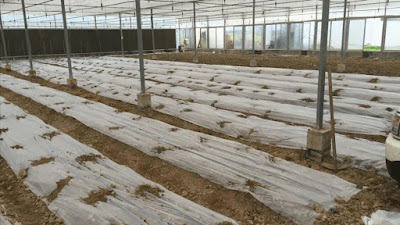Recently, prosecutors from the Procuratorate of Wenling City, Zhejiang Province came to the field together with the staff of the local administrative functional departments to check the recycling of much film. A farmer who is participating in the recycling of agricultural film said with a smile: "It is great to collect agricultural mulch and get subsidies!"
Wenling City has abundant natural resources and developed agricultural production. Commercial agricultural production is inseparable from agricultural mulch film. At the beginning of this year, the Wenling City Procuratorate found in the course of performing its duties that discarded agricultural film was piled up on both sides of the fields and ditches, which were not recycled in time. In response to this problem, since March, the Wenling City Procuratorate has carried out a special supervision campaign on agricultural non-point source pollution.
On the basis of full investigation and evidence collection, the Wenling City Procuratorate issued an administrative public interest litigation pre-litigation procuratorial suggestion to the functional department, suggesting that it take effective measures to strengthen the supervision and management of the use and recycling of agricultural materials such as agricultural mulching films and fertilizers. After receiving the procuratorial suggestion, the functional departments attached great importance to it, combined with the investigation of outstanding ecological and environmental problems in the city, and carried out the "hundred-day tackling" action. In April this year, Taizhou took the lead in starting the recycling and disposal of waste mulch film.
Since the standardized recycling of agricultural film has not been adopted before, the agricultural film is buried very deep, and some are even accumulated in the river, which needs to be manually checked and cleaned up by town and village. Fortunately, the work of "digging three feet of land" has paid off. Since the beginning of April this year, Wenling City has cleared more than 600 tons of discarded agricultural film from four townships. At the same time, hundreds of tons of discarded mulch film were uniformly transported to a local renewable resource utilization enterprise.
It is understood that most of the agricultural film components are polyethylene compounds. Some agricultural films with relatively good quality and low degree of natural decomposition will be turned into recycled plastic particles after being cleaned and pulverized by hot-melting, extrusion and other processes. These black recycled plastic particles can be turned into plastic daily necessities through processing. As for the poor quality agricultural film, it will also be screened out after cleaning, and transported to the local thermal power station, where it will be fully burned to use the waste heat.
"After the historical stock is cleaned up, we will recycle the agricultural film according to the principle of 'who uses it, who recycles'." The person in charge of the relevant functional department told the prosecutor. In the follow-up, functional departments will also explore the implementation of closed-loop management measures, use the digital platform for agricultural resources distribution to build a comprehensive management platform for recycling, collect information on the whole process of recycling, and gradually establish a closed-loop management system with traceable data and accountability, and agricultural investment "progress". "Sell-Use-Return" responsibility sharing mechanism for the entire industry chain.





No comments:
Post a Comment